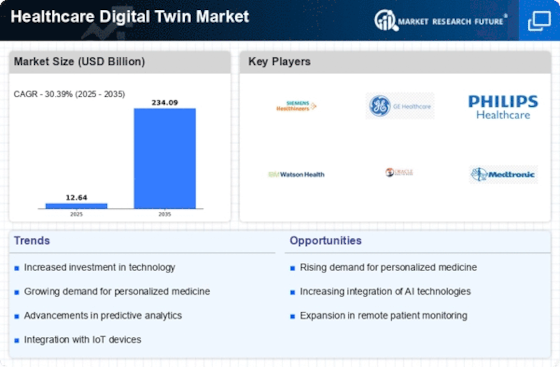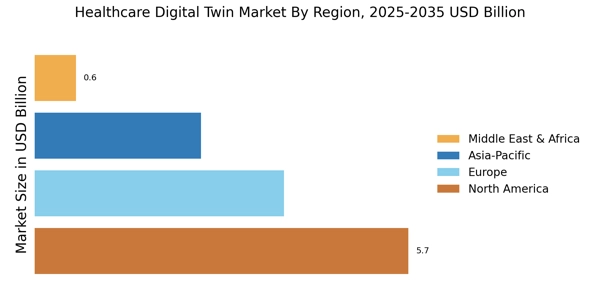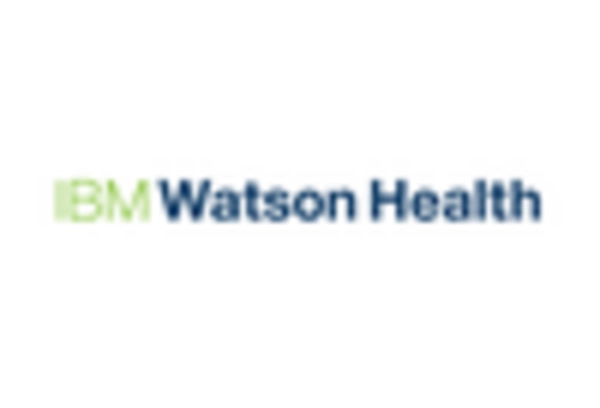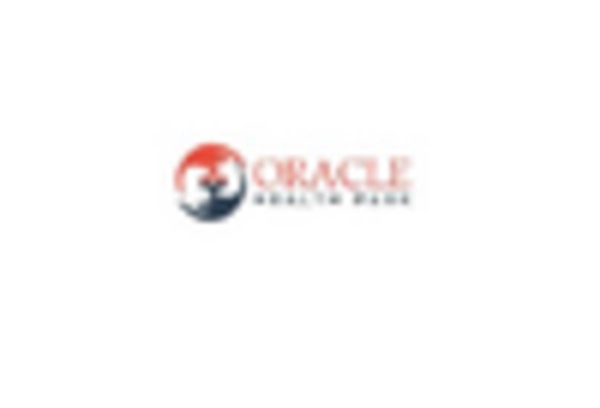North America : Innovation and Investment Hub
North America is the largest market for healthcare digital twins, holding approximately 45% of the global share. The region's growth is driven by significant investments in healthcare technology, increasing demand for personalized medicine, and supportive regulatory frameworks. The U.S. leads this market, followed closely by Canada, as both countries prioritize digital health initiatives and innovation in patient care.
The competitive landscape is dominated by key players such as GE Healthcare, IBM Watson Health, and Oracle Health, which are leveraging advanced technologies to enhance healthcare delivery. The presence of established healthcare systems and a strong focus on research and development further bolster the market. As digital twin technology evolves, North America is expected to maintain its leadership position, fostering collaborations between tech companies and healthcare providers.
Europe : Emerging Market with Regulations
Europe is witnessing rapid growth in the healthcare digital twin market, accounting for approximately 30% of the global share. The region benefits from stringent regulations that promote patient safety and data security, driving demand for innovative healthcare solutions. Countries like Germany and the UK are at the forefront, implementing policies that encourage the adoption of digital health technologies and improve healthcare outcomes.
Leading players in Europe include Siemens Healthineers and Philips Healthcare, which are actively developing digital twin solutions tailored to local healthcare needs. The competitive landscape is characterized by collaborations between technology firms and healthcare providers, enhancing the integration of digital twins into clinical practice. As regulatory frameworks evolve, Europe is poised for significant advancements in healthcare digital twin applications, improving patient care and operational efficiency.
Asia-Pacific : Rapid Growth and Adoption
Asia-Pacific is rapidly emerging as a significant player in the healthcare digital twin market, holding around 20% of the global share. The region's growth is fueled by increasing investments in healthcare infrastructure, a rising aging population, and a growing emphasis on personalized medicine. Countries like China and Japan are leading the charge, with government initiatives aimed at integrating advanced technologies into healthcare systems.
The competitive landscape features a mix of local and international players, including Medtronic and Accenture, who are focusing on developing tailored solutions for the region's unique healthcare challenges. The presence of a large patient population and a growing demand for efficient healthcare delivery systems further drive the adoption of digital twin technologies. As the market matures, Asia-Pacific is expected to see enhanced collaboration between technology providers and healthcare institutions, fostering innovation and improving patient outcomes.
Middle East and Africa : Emerging Market with Potential
The Middle East and Africa region is gradually emerging in the healthcare digital twin market, currently holding about 5% of the global share. The growth is primarily driven by increasing investments in healthcare infrastructure, government initiatives to enhance healthcare delivery, and a rising focus on digital transformation. Countries like the UAE and South Africa are leading the way, implementing policies that support the adoption of advanced healthcare technologies.
The competitive landscape is characterized by a mix of local startups and international players, including Dassault Systèmes and SAP, who are exploring opportunities in this nascent market. The region's unique healthcare challenges present opportunities for innovative solutions, and as digital twin technology gains traction, it is expected to play a crucial role in improving healthcare outcomes and operational efficiency across the region.

















